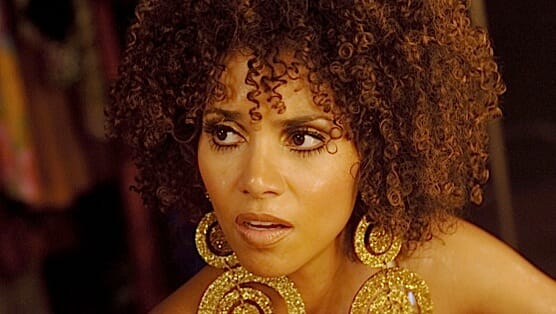Frankie & Alice

Sometimes, through no particular creative fault of their own, and for reasons attached more to dubious financiers, labyrinthine contracts and the bizarre grudges of people in suits whose names you’ll never know, movies sit on the shelf after completion, gathering dust and the reputation of being a stinker. Such is the case with Halle Berry’s Frankie & Alice, admittedly a generously apportioned slice of awards-bait pie, but a well-rendered and engaging psychological drama nonetheless.
After a premiere at Cannes in 2010, the film received a head-feint awards push in December of that year; it opened in exactly one theater, and in advance of what was supposed to be a nationwide release in February 2011, screeners were mailed to various critics’ organizations. It even netted Berry a Golden Globe nomination. Then … nothing. The reasons for the film’s distributor-assisted suicide depend on whom you believe, but now, almost three-and-a-half years later, it’s seeing the light of day in a theatrical re-release. And the truth is that it’s not that bad.
Set in Los Angeles in 1973, Frankie & Alice stars Berry as Frankie Murdoch, a go-go dancer prone to blackouts that leave her in compromised scenarios, and with no memory of how she got there. Frankie does her best to keep the fallout from these manifestations secret from her mother, Edna (Phylicia Rashad) and younger sister, Maxine (Chandra Wilson), but they’re aware of her so-called spells and fits.
After one such episode lands her in the middle of traffic, Frankie comes under the care of Dr. Oz (Stellan Skarsgård), a sympathetic psychiatrist whose commingled patience and unconventional methods (a holdover from his previous experimentation with LSD, perhaps) prove advantageous in eliciting an accommodating treatment response. His diagnosis: dissociative identity disorder. Working in hypnosis with Frankie and her two alter personalities—consisting of a frightened, unnamed seven-year-old, dubbed Genius by the clinician, and Alice, an older and rather racist Southern white lady—Dr. Oz delves into his patient’s unresolved childhood trauma, and helps pull her toward more normalized balance.
For a movie about multiple personalities, Frankie & Alice has a lot of figures pushing it in different directions: no fewer than six writers share credit on the script. To that end, it’s obvious that the film, which already has a big, meaty narrative hook, was crafted and combed over to suit various agendas. In flashbacks, we come to understand more about young Frankie’s (Vanessa Morgan) life, in scenes with a suitor, Pete (Scott Lyster), whose affection cuts across boundaries of race and class. The repression of these memories is too easily correlated to Frankie’s current mental state, however. The writers seem eager to “solve” a mystery of dubious construction.
-

-

-

-

-

-

-

-

-

-

-

-

-

-

-

-

-

-

-

-

-

-

-

-

-

-

-

-

-

-

-

-

-

-

-

-

-

-

-

-








































